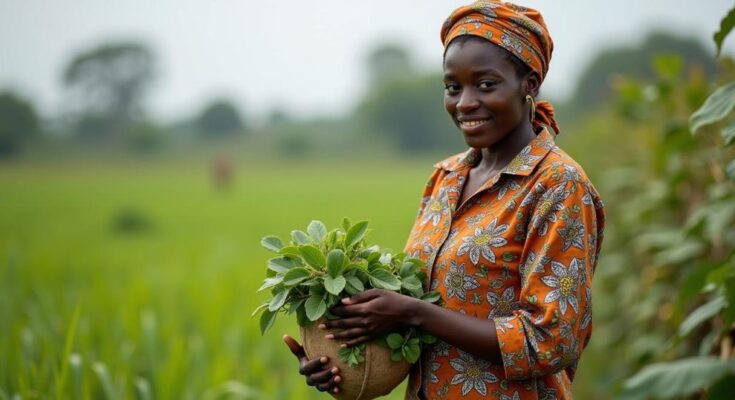Women comprise about 70% of Ghana’s agricultural workforce, primarily as smallholder farmers utilizing organic practices that protect the environment. They play a vital role in biodiversity conservation, deforestation reduction, and climate change advocacy. Awula Serwah emphasizes the necessity for gender equality in climate leadership and calls for support of women working in this field.
In Ghana, women play a crucial role in the agricultural sector, representing approximately 70 percent of the workforce in agriculture and associated industries. These women, primarily smallholder farmers, engage in ecological and organic farming practices, which significantly reduce the reliance on external inputs and synthetic chemicals. This approach not only preserves the environment but also contributes to crucial ecological benefits such as biodiversity conservation and the reduction of deforestation. Despite facing limited resources, woman farmers implement agroecological methods that aid in carbon sequestration and the mitigation of greenhouse gas emissions. Their deep connection and dependency on natural resources drive their commitment to protecting these vital resources from environmental degradation. Furthermore, these women are increasingly uniting as part of a larger social movement advocating for substantial changes in the agricultural sector with the aim of decreasing carbon emissions. They emphasize the necessity for swift and decisive climate action from the government and advocate for agro-ecology to be central in Ghana’s climate response strategies. Awula Serwah, a prominent environmentalist and coordinator for the Eco-Conscious Citizens Ghana, has pointed out the specific challenges that climate change and environmental degradation pose, particularly for women and girls. She stated, “Climate change and environmental degradation affect everyone. They are not respecter of persons. In communities where women and girls are responsible for food production, fetching water and fetching fuel for cooking, it is especially challenging for them.” In discussing the intersection of gender equality and climate change, Ms. Serwah asserted that leadership in climate adaptation should not be confined by gender. She remarked, “Anyone with a passion, an understanding of climate adaptation and the necessary skills and willingness to lead, should lead. It is crucial that we work towards gender equality but we shouldn’t make climate change a gender issue.” Ms. Serwah referenced the legacy of Kenyan environmentalist, Professor Wangari Maathai, who founded the Green Belt Movement and was the first African woman to be awarded the Nobel Peace Prize for her environmental contributions. She noted, “A determined woman with a lot on her plate can lead on climate adaptation just as well as a man. We had Prof Maathai leading on the environmental matters long before people understood the importance of the environment and ended up being the first African woman to win a Nobel Peace Prize for her environmental work. The key point is not that she was a woman, but that she was deeply passionate about the environment and was driven to make a difference.” Moreover, Ms. Serwah has called for governments and policymakers to create efficient strategies that promote the inclusion and empowerment of women in climate change initiatives. She advocates for an environment where motivated women leaders are given the necessary support to lead in combating climate change, emphasizing, “We all have a constitutional duty to protect the environment, and we should demand action.”
Ghana has seen a significant proportion of its agricultural workforce consist of women, who not only engage in farming but also advocate for sustainable practices that combat climate change. These women are critical to ensuring food security and environmental sustainability within their communities, often working under challenging conditions with minimal resources. The intersection of gender and climate change highlights the need for comprehensive support systems that empower women in environmental leadership roles, acknowledging their unique contributions and perspectives in the fight against climate degradation. The global recognition of leaders like Wangari Maathai emphasizes the importance of gender inclusivity in climate advocacy.
In summary, women farmers in Ghana are pivotal in the fight against climate change, leading initiatives that prioritize ecological sustainability and advocating for government action. Their efforts underscore the need for gender inclusivity in environmental leadership, as demonstrated by figures such as Awula Serwah and historical leaders like Professor Wangari Maathai. Addressing the challenges faced by these women is crucial for effective climate action and environmental protection.
Original Source: www.un.org




